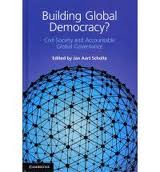Sasha Jesperson finds Jan Aart Scholte‘s diverse analysis of civil society’s role in improving the accountability of global governance organisations to be cohesive and powerful.
Building Global Democracy? Civil Society and Accountable Global Governance. Jan Aart Scholte. Cambridge University Press. April 2011.
Find this book at: ![]() Google Books
Google Books ![]() Amazon
Amazon
 Global governance bodies are “proliferating and growing in significance”. However, unlike states, which are accountable to their citizens, the accountability of global governance bodies is uncertain. Jan Aart Scholte, Professor in the Department of Politics and International Relations at the University of Warwick, argues in Building Global Democracy? Civil Society and Accountable Global Governance that without being held accountable, global governance bodies will fail to achieve their purposes, generate limited support and undermine core societal values. As such, accountable global governance is essential for today’s more global world. Scholte contends that states can no longer fulfil this role, and sets out to explore civil society as a pathway to accountability.
Global governance bodies are “proliferating and growing in significance”. However, unlike states, which are accountable to their citizens, the accountability of global governance bodies is uncertain. Jan Aart Scholte, Professor in the Department of Politics and International Relations at the University of Warwick, argues in Building Global Democracy? Civil Society and Accountable Global Governance that without being held accountable, global governance bodies will fail to achieve their purposes, generate limited support and undermine core societal values. As such, accountable global governance is essential for today’s more global world. Scholte contends that states can no longer fulfil this role, and sets out to explore civil society as a pathway to accountability.
The first chapter sketches the core concepts of the book. Global governance is broadly defined as “a complex of rules and regulatory institutions that apply to transplanetary jurisdictions and constituencies”. Accountability is seen in terms of “processes whereby an actor answers for its conduct to those whom it affects”, and civil society is “a political arena where associations of citizens seek from outside political parties to shape societal rules”. As could be expected, the chapter does not seek to establish fixed or final definitions of these concepts, but rather it tackles the broad nature of global governance, accountability and civil society. For instance, the section on accountability delves into questions such as what is entailed by accountability, how does it relate to global governance agencies, what are they accountable for, to whom, by what means do they practice accountability, and how adequate these instruments are.
From here the book assesses the relationship of global governance accountability and civil society through 13 case studies. The first six case studies deal with traditional intergovernmental forms of global governance, two chapters look at transgovernmental arrangements, one chapter looks at interregional bodies, two cases focus on private global governance, and another two focus on public-private combinations. Each chapter sets out the mandate and activities of the global governance body, its accountability challenges, civil society engagement with the body and what effect this has. The result is a diverse analysis of civil society’s role or potential role in improving the accountability of global governance organisations. Interestingly, the chapter on assessing the Organisation of the Islamic Conference (OIC) draws out what civil society and accountability mean from an Islamic perspective.
While the chapters generally conclude that civil society has had a positive impact on the accountability of global governance bodies, Kerstin Martens’ chapter on the UN argues that “although many CSO activities have made the UN more answerable for its conduct, one must not overestimate the influence of CSOs within the UN apparatus or assume that they provide a total answer to the many problems of UN accountability”. Martens contends that the formal options of UN-civil society engagement allows the UN to control the interaction and its impact.
Scholte’s compilation acknowledges that the relationship between civil society and global governance bodies is highly complex. In attempting to answer a seemingly simple question, “in what ways and to what extent have civil society activities made global regulatory institutions more answerable to the people whose lives and livelihoods are affected?”, the book draws out many complex issues: accountability for whom and for what purpose; accountability within CSOs; and personal, institutional and structural issues within CSOs and global governance bodies.
As an edited volume, the book forms a cohesive narrative. The editor has set clear questions for contributors to adhere to in order to achieve consistency, while leaving enough freedom to explore the varied nuances of each case. However, as civil society is framed by diversity, the contributions can only provide broad sketches of the various civil society actors that engage with each global governance body. Nevertheless, this leads to some powerful conclusions: the accountability of civil society is as mixed as global governance bodies, civil society engagement often conforms to structures of social inequality, and northern CSOs often dominate interactions with global governance bodies. In highlighting the problems with civil society and global governance bodies in accountability, this volume provides concrete steps on how to improve accountability. As the international system moves further away from a focus on states, this analysis will be of increasing importance.
Find this book at: ![]() Google Books
Google Books ![]() Amazon
Amazon
Sasha Jesperson is a PhD student in the Department of Government at LSE.





